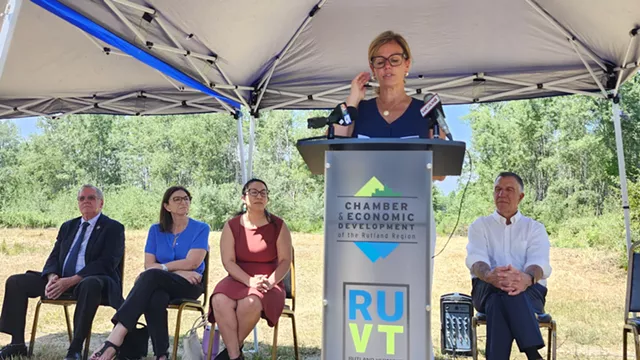Scott praised lawmakers for working with his administration to pass S.127, the Community and Housing Infrastructure Program, or CHIP.
The program promises to help cities and towns finance up to $2 billion worth of roads, sidewalks, and water and sewer lines that are often cost prohibitive for housing developers to build themselves.
Municipalities will soon be able to use a streamlined version of tax-increment financing, or TIF, to pay for infrastructure upgrades upfront and pay off the investments over time with the higher property taxes that result from new housing.
Expected to open for applications in early 2026, the program was one of the most contentious and consequential initiatives adopted this past session. Its size — $200 million per year through 2035 — grew dramatically at the end of the session. Lawmakers initially sought to keep it modest but became convinced more bold action is needed.
“CHIP allows for smaller, more rural communities with fewer resources than bigger cities and towns to leverage the TIF model for projects in their communities,” Scott said.
Fair Haven town manager Joe Gunter praised state officials for giving towns such as his a “powerful tool” to help build housing. The ceremony was on the former site of the Fairmont Speedway, a dirt motor track that operated until the 1960s. The site has been “fallow for decades” and contributes “nothing to the town,” Gunter said.
The property is owned by Reed and Vanessa Hampton, who bought it in 2007 hoping to relocate their lighting fixtures business, Hubbardton Forge, there, but never did. The company is now under new ownership in Castleton.
Gunter said the property is a perfect site for single-family homes aimed at middle-income people.
“This is where the market has failed us,” Gunter said. “The cost to build a home doesn’t match what the market will support in our area. This is where government can step in, and to their credit they did step in. They stepped up to help our working-class families.”
Reed Hampton said he doesn’t even have a developer lined up for the site, let alone a clear sense of how many homes it could support or what permits would be required.
Gunter said a development of single-family homes on half-acre lots makes sense, but it would all depend on permitting and the CHIP process, which could take two years or more.
Getting such homes built as quickly as possible is vital for businesses to be able to attract and retain workers, said Maria Mullen, CEO of Hubbardton Forge, which employs about 200 people.
“The housing shortage is not just a humanitarian concern; it is a business problem,” Mullen said.
The racetrack is about a mile from downtown Fair Haven and outside its designated village center area. Some lawmakers had wanted to limit projects that could be eligible for the CHIP program to such areas.
The idea was to leverage public infrastructure dollars where the state has tried to focus growth in order to prevent sprawl. Such provisions were stripped from the bill to make it more expansive and easier for more small towns to use.
Sen. Kesha Ram Hinsdale (D-Chittenden-Southeast), a strong advocate for the expansive version of the bill, said removing that restriction was the right call. It will ultimately allow more projects and will help more cities and towns control their own destinies.
“We will not be self-sustaining without housing, and we will not have housing unless we have infrastructure. It’s is as simple as that,” she said.

